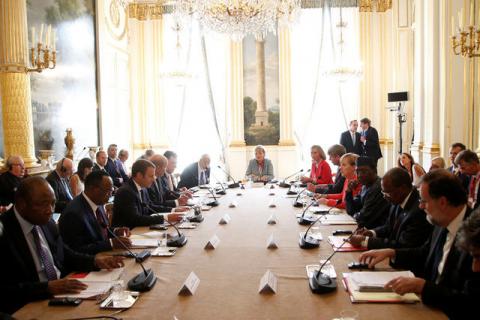Advertisement
Europeans, Africans agree renewed push to tackle migrant crisis
PARIS (Reuters) - Europe's "big four" continental powers and three African states agreed a plan on Monday to tackle illegal human trafficking and support nations struggling to contain the flow of people across the desert and Mediterranean sea.
The 28-nation European Union has long struggled to reach a coherent answer to the influx of migrants fleeing war, poverty and political upheaval in the Middle East and Africa, and the crisis is testing cooperation between member states.
After hosting the leaders of Germany, Italy, Spain, Chad, Niger and Libya, French President Emmanuel Macron said it was time for greater coordination.
"We must all act together - from the source countries to Europe and passing by the transit countries, especially Libya - to be efficient," he told reporters. "It’s a challenge as much for the EU as for the African Union."
While the meeting was sparse on concrete details, the leaders agreed on the principle of setting up a mechanism to identify legitimate migrants who are fleeing war and persecution, and to use the United Nations to register them in Niger and Chad so as to prevent them being exploited by traffickers.
"At the core of it, it’s all about fighting illegal migration," German Chancellor Angela Merkel told a news conference.
She said that Berlin was willing to increase its efforts.
"If we want to stop human traffickers, then this can only be achieved through development aid," she said.
The migrant crisis has put Paris and Rome at odds. Italy has accused France and other EU states of not sharing the migrant burden and has also asked the EU Commission for more budget flexibility to help it tackle the crisis.
Nearly 120,000 migrants, including refugees, have entered Europe by sea so far this year, according to the International Organization for Migration. More than 2,400 have drowned while making the dangerous journey, often without enough food or water in overcrowded dinghies run by people smugglers.
"We are all committed to reducing the damage, the death of Africans in the desert, the death of Africans crossing the Mediterranean," Chad President Idriss Deby said.
"The fundamental problem will always remain development. We need resources," he said.
The informal meeting did not outline any new specific financing and the leaders repeated that stabilizing chaotic Libya, where thousands of migrants end up before embarking on a perilous Mediterranean sea journey to Europe, would be key to any long-term solution.
(Additional reporting by Michel Rose in Paris, Steve Scherer, Gareth Jones and Massimiliano Di Giorgio in Rome, Sarah White in Madrid, Paul Carrell and Michael Nienaber in Berlin; Editing by Richard Lough and Andrew Bolton)



















Add new comment